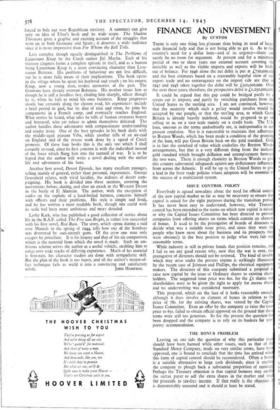FINANCE AND INVESTMENT
By CI'STOS
THERE is only one thing less pleasant than being in need of large- scale financial help and that is not being able to get it. As to this country's need for a dollar loan—and of its urgency—there can surely be no room for argument. At present and for a minimum period of two or three years our external account covering the invisible as well as the visible imports and exports will be badly out of balance. For 1946 alone the net debit is put at £75o,000,000
and the best estimates based on a reasonably hopeful view of our export trade and no extravagance on the import side are that in 1947 and 1948 taken together the debit will be £5oo,000,000. Over the next three years, therefore, the prospective debit is Li,z5o,000,000. It could be argued that this gap could be bridged partly by a severe cut in imports and partly by switching purchases from the United States to the sterling area. I am not convinced, however, that the austerity which such a policy would involve would be accepted by our people, or that the -sterling area, to which Great Britain is already heavily indebted, would be prepared to go on selling to us on a vast scale mainly on a credit basis. The U.S. loan, onerous as the terms undoubtedly are, is indispensable in our present condition. Nor is .it reasonable to maintain that adherence to Bretton Woods, which has been made a condition of the granting of the loan, will put Great Britain back on the gold standard. Gold is in fact the standard of value which underlies the Bretton Wocds arrangements, but that is a very different thing from the inelastic gold standard which brought deflation and unemployment between the two wars. There is enough elasticity in Bretton Woods to give this country substantial safeguards against any deflationary influences from across the Atlantic. It will be up to the United States to give a lead in the freer trade policies whose adoption will be essential t the success of a multilateral system.
ISSUE CONTROL POLICY Everybody is agreed nowadays abOut the need for official corm of the new capital market so far as may be necessary to ensure tha capital is raised for the right purposes during the transition perios It has never been easy to understand, however, why Treasury control has been extended to the terms on which new capital is raised, or why the Capital Issues Committee has been directed to prevent companies from offering shares on terms which contain an element of bonus. It used to be the prerogative of boards of directors to decide what was a suitable issue price, and since they were the people who knew most about the business and its prospects they were obviously in the best position to judge what were fair and reasonable terms.
While industry is still in private hands that position remains, and I fail to see any good reason why, now that the war is over, this prerogative of directors should not be restored. The kind of trouble which may arise under the present regime is strikingly illustratecr• by the recent case of Johnson and Phillips, the electrical equipment makers. The directors of this company submitted a proposal to raise new capital by the issue of Ordinary shares to existing share- holders. The suggested issue price was 6os. for the Li shares and shareholders were to be given the right to apply for _excess shares. and no underwriting was considered necessary.
This proposal, which on the face of it looks reasonable enough
although it does involve an element of bonus in relation to the price of 78s. for the existing shares, was vetoed by the Capital Issues Committee. Even an offer by the company to raise the issue price to 65s. failed to obtain official approval on the ground that these terms were still too generous. So for the present the question has been dropped and the company is to rely on its bankers for tem- porary accommodation.
THE BONUS PROBLEM
Leaving on one side the question of why this particular issue should have been banned while other issues, such as that of the Standard Motor Company, made on very similar terms, have beer approved, one is bound to conclude that the time has arrived whet this form of capital control should be reconsidered. Often a bonus is _a suitable alternative to large cash dividends, since it enable( the company to plough back a substantial proportion of earnings Perhaps the Treasury objection is that capital bonuses may enable the surtax payer to sell the extra shares in the market and trea, the proceeds as tax-free income. If that really is the objection I is demonstrably unsound and it should at least be stated,


























 Previous page
Previous page